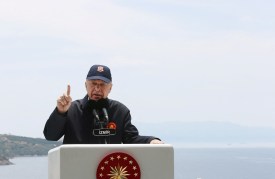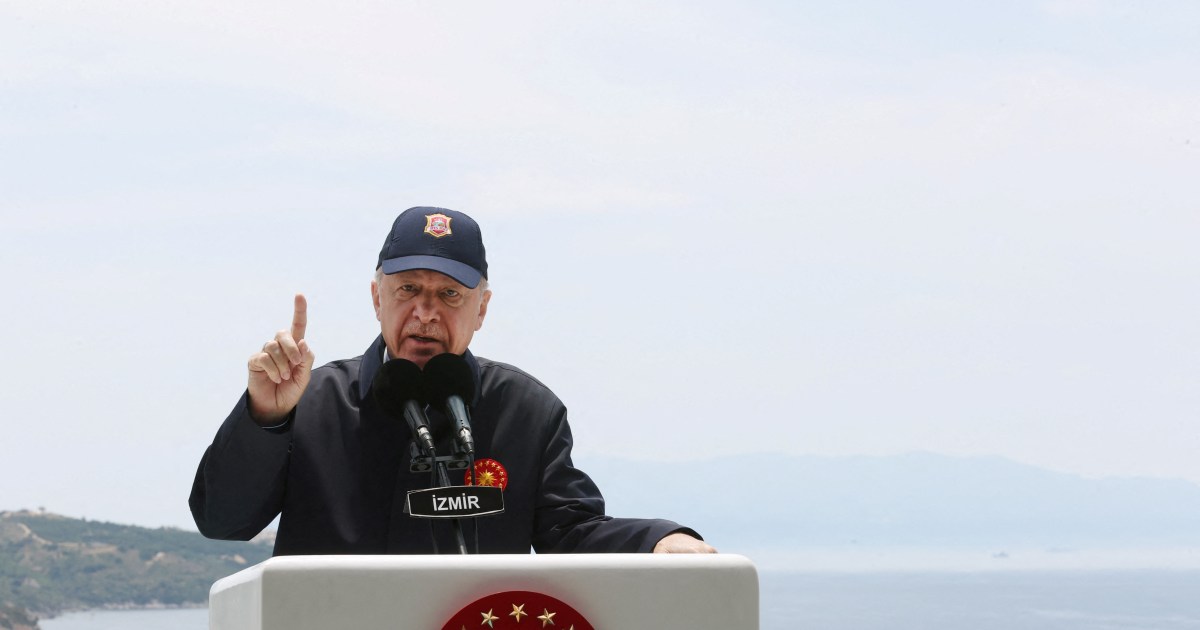
In a historic summit this week, the North Atlantic Treaty Organization will adopt a new Strategic Concept, its first in 12 years, to guide the alliance’s policies in an increasingly uncertain European security environment. However, looming over it is Turkish President Recep Tayyip Erdoğan’s objection to membership for Sweden and Finland. Early expectations that Erdoğan would allow himself “to be cajoled, persuaded, and eventually rewarded for his cooperation” have not materialized. A last minute effort to negotiate a breakthrough last week also failed, leaving NATO Secretary General Jens Stoltenberg to pin his hopes for a “soon as possible” post-summit resolution of the deadlock.
Erdoğan’s intransigence is widely attributed to domestic political considerations, including a desperate need to divert attention from the dire state of Turkey’s economy as well as boosting his sagging poll ratings by playing to rampant nationalist and anti-Western feelings. As plausible as these explanations are, underlying them is also Erdoğan’s own discomfort with Turkey’s longstanding Western vocation, symbolized by its membership in NATO as well as in the Council of Europe. He is instrumentalizing the issue of Sweden and Finland’s membership to weaken this vocation, if not break it, to eliminate remaining institutional checks on his one-man rule.
It is important that the United States and its NATO allies avoid policies that would play into Erdoğan’s agenda until the national elections — in June 2023 — before writing off a Western-oriented Turkey completely. This could keep alive the prospects of a Turkey able to reconstruct its democracy and its economy, and to better serve its own and the trans-Atlantic alliance’s security interests, in volatile times.
What lies behind Erdoğan’s opposition to Swedish and Finnish NATO membership
Erdoğan first announced that he did not view the NATO membership bids of either Finland or Sweden favorably, on the grounds that they had become “safe houses” for terrorists. This was a reference to the presence and activities of individuals and organizations with ties to the Kurdistan Workers’ Party (PKK) as well as Gülenists, widely recognized to be the perpetrators of the coup attempt against him in July 2016. The announcement came on May 13 and may initially have been an attempt to divert attention from two events around that time: a political ban of opposition politician Canan Kaftancıoğlu, widely credited for engineering the defeat of Erdoğan’s preferred candidate in Istanbul’s 2019 mayoral elections, and the violent intervention by Israeli police during the funeral of the slain Palestinian-American journalist Shireen Abu Akleh, over which Erdoğan chose to remain uncharacteristically silent. He subsequently intensified his objections by adding that “all forms of arms embargoes,” especially by Sweden, against Turkey’s defense industry go against “the spirit of military partnership under the NATO umbrella.”
Erdoğan has since made it clear that he will not easily relinquish his veto unless these objections are addressed. A flurry of diplomatic activities followed to address what Stoltenberg on numerous occasions defined as Turkey’s “legitimate” concerns, without concrete results. The deadlock appears to result from different definitions of “terrorism” and Erdoğan’s insistence on the extradition of persons including Swedish nationals and a member of the Swedish parliament. It goes without saying that direct material support, as highlighted by several experts and former Turkish diplomats, provided to the PKK — recognized by Turkey, the United States, and the European Union as a terrorist organization — is indeed problematic and needs to be resolved. The complication arises from a definition of terrorism in Turkish law that goes beyond criminalizing participation in violent acts and infringes on basic freedom of speech. This loose and often aggressive framing of the terms terrorist and terrorism is regularly used by Erdoğan and members of his government to silence and repress their critics and opponents.
Erdoğan’s uncompromising stance contrasts with the earlier years of his leadership of Turkey, when he seemed to be committed to liberal democratic values and when Ankara — with considerable U.S., Finnish, and Swedish support — started its accession process towards EU membership. Turkey achieved its greatest integration with the trans-Atlantic community, and shared peacekeeping responsibilities on behalf of NATO in its neighborhood, and persistently supported NATO’s enlargement including the “open door” policy.
Erdoğan has since transformed Turkey’s parliamentary system to a presidential one with practically no checks and balances on his power. Growing authoritarianism and repression of critics and opponents has become a defining face of the country, with the sentencing of civil society activist Osman Kavala and Selahattin Demirtaş, former leader of the main Kurdish political party, together with the likelihood that Istanbul Mayor Ekrem Imamoğlu, who enjoys higher poll ratings than Erdoğan, may well face a political ban too.
NATO has became another target of Erdoğan’s vitriol as he blames the West for Turkey’s growing economic ills and political isolation. This goes back to the aftermath of the 2016 coup attempt, when members of parliament from the ruling Justice and Development Party (AKP) alleged NATO involvement without presenting a shred of evidence, even calling it a “terror organization.” This allegation has been periodically nurtured by the government even if Erdoğan has personally avoided it. Yet, Erdoğan’s close relationship with Russian President Vladimir Putin, decision to purchase S-400 missiles from Russia, and a relentless diplomatic battle over them with Washington has deeply damaged the reliability of Turkey as a NATO ally. Skepticism about Turkey’s place in the alliance was further aggravated by Erdoğan’s threat to expel 10 Western ambassadors, seven of them from allies, for asking him to implement a European Court of Human Rights (ECHR) ruling and release Kavala. Instead, Erdoğan chose to categorically dismiss the ECHR decision as well as the Council of Europe’s initiation of disciplinary action against Turkey.
This persistent anti-Western and anti-U.S. narrative has found a receptive mood in a Turkish citizenry deprived of access to alternative discourses. Not surprisingly, the Turkish public in recent years has perceived a greater security threat from the United States than from Russia (see slides 81-83 here). According to Metropoll, a public opinion research company, 65% of respondents in April 2022 did not trust NATO; in January, 39.4% preferred closer relations with China and Russia compared with 37.5% preferring closer relations with the EU and U.S.
The geopolitical realities limiting Erdoğan and NATO
Yet despite the anti-Western sentiments that Erdoğan has stirred, he remains spectacularly shy of severing ties with NATO. His intermittent faceoffs over the past few years have not reached a point where he can afford to announce Turkey’s abandonment of the alliance. The loudest that he can speak domestically is when he remains silent at suggestions that Turkey should leave NATO, as his political ally Devlet Bahçeli, the leader of ultra-nationalist Nationalist Movement Party, boldly advocated last month. For Western audiences, he even reiterated in a recent piece in The Economist his commitment to NATO and its expansion. Erdoğan’s ambiguity as to whether he is willing or capable of breaking Turkey from NATO and the broader West demonstrates the limits of his power, and offers an opening for policy considerations.
The Turkish president has found himself in a spot where he must negotiate his discomfort with the West and all that it represents with the reality on the ground. The geopolitical situation surrounding Turkey — and specifically, Russia’s war on Ukraine — is exacerbating the country’s economic ills and adversely impacting its national security. Close to 58% of the Turkish public still believes NATO is needed for Turkey’s security. Erdoğan’s objection with Sweden and Finland joining NATO is a symptom of his aversion to the values represented by Turkey’s own membership in the alliance and other Western institutions, most notably the Council of Europe and European Court of Human Rights. These values and institutions are an impediment to his one-man rule as well as his ideological goal of eventually breaking Turkey’s traditional Western vocation.
But NATO also needs Turkey, as highlighted by a former commander of American forces in Europe who remarked, “I don’t even want to think of NATO without Turkey.” Turkey’s future in NATO will largely depend on the results of the country’s elections next year. The opposition has repeatedly expressed its commitment to revive Turkish democracy even if on foreign policy, so far, they have either stayed out of sight or felt obliged to toe Erdoğan’s nationalist line. Until then it is important not to write off Turkey.
In the case of Sweden and Finland’s accession to NATO, one can expect the two sides to meet eventually in a pragmatic solution. In the event of a failure, key NATO members like the U.S. and United Kingdom appear willing to extend Sweden and Finland bilateral security assurances. Ultimately, keeping Turkey in NATO could once more — just like 70 years ago when it first joined the alliance — serve as a conduit for mutually reinforcing Turkey’s Western vocation and its democracy while benefiting trans-Atlantic security, especially at such challenging times that the new NATO Strategic Concept is meant to address.


